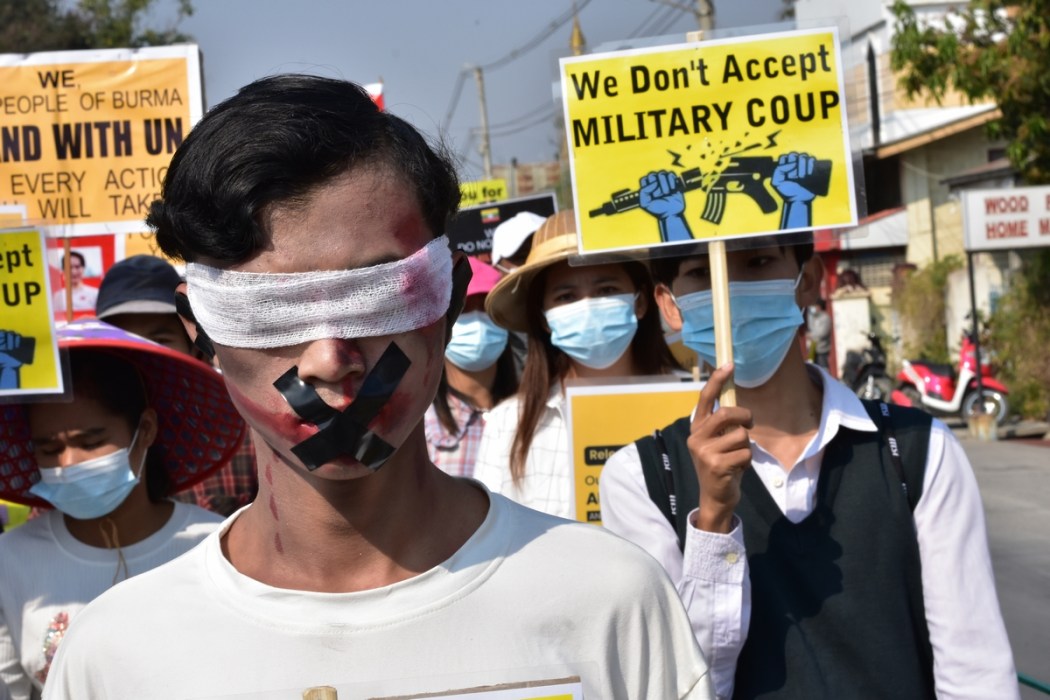By Oiwan Lam
The term “seafood” went viral on social media last week in connection with the Myanmar military takeover after the Chinese Embassy in Yangon denied daily flights from China were providing assistance to the coup government.
Reports of cargo flights between Kunming and Yangon have raised suspicions among Myanmar pro-democracy activists that China was sending experts and equipment to assist Myanmar’s military, which took over the country’s civilian government on February 1. A response statement by the Chinese Embassy claimed the planes were simply carrying seafood, which sounded implausible to many.

Unverified claims about China’s backing of the Myanmar coup started circulating in early February, as all Chinese state-affiliated media outlets were using the phrase “a major cabinet reshuffle” to describe the military takeover. Although the Chinese government has so far taken no official stand, the fact that China blocked the UN Security Council’s condemnation of the junta has led many to believe that Beijing is backing the coup for geopolitical reasons.
Photos showing “seafood” cargo arriving late at night in Yangon went viral:
Huge seafood arrived from China to Yangon! #ChineseCargoYGN #ShameonyouChina #militarycoupinMyanmar pic.twitter.com/NRPmlEWHli
— Nantigks (@nantigks) February 11, 2021
Kyaw Win of the Burma Human Rights Network highlighted the meaning of the viral usage of “seafood:”
Chinese foreign ministry spokesperson Wang Wenbin said he had not heard of any arrangement involving the sending of experts and equipment to Yangon.
Myanmar’s citizens began protesting in front of the Chinese Embassy days after the coup took place. Netizens have also been using hashtags such as #ShameOnYouChina and #ChinaHelpMilitaryCoupForOwnBenefit on social media.
Twitter user @Ellen5461 posted a few photos of a protest where some of the placards bear slogans written in Chinese, saying “Stand by Myanmar, do not support dictatorship”:
@Alicebrosel posted a photo of another protester dressed in Chinese costume holding a placard saying “Myanmar military dictatorship is made in China”:
Myanmar citizens are also concerned about the introduction of a Cybersecurity Bill by the military government that empowers authorities to block websites, remove content, and charge individuals for spreading misinformation. As China is the world’s top expert in controlling and censoring web traffic, many see the country as playing a key role in the bill’s implementation.
Twitter user @ruddy5702 said:
Myanmar citizens’ access to the internet has been periodically disrupted since the coup took place. However, starting on February 14, near-total internet shutdowns have been reported by digital rights organization NetBlocks between 1 a.m. and 9 a.m.:
There is also speculation that the recurring power outages experienced in the country in the past few days are related to the testing and setup of Myanmar’s version of The Great Firewall. Language decoding issues faced by some Myanmar netizens have also reinforced this idea, as noted by user @blahbla69235153:
Amidst criticisms from Myanmar and worldwide, Beijing’s ambassador to Myanmar Chen Hai denied that China had been “informed in advance of the political change” and said that the current situation was “absolutely not what China wants to see.”
This article originally appeared on Global Voices.
Support HKFP | Policies & Ethics | Error/typo? | Contact Us | Newsletter | Transparency & Annual Report | Apps
| HKFP is an impartial platform & does not necessarily share the views of opinion writers or advertisers. HKFP presents a diversity of views & regularly invites figures across the political spectrum to write for us. Press freedom is guaranteed under the Basic Law, security law, Bill of Rights and Chinese constitution. Opinion pieces aim to point out errors or defects in the government, law or policies, or aim to suggest ideas or alterations via legal means without an intention of hatred, discontent or hostility against the authorities or other communities. |
Help safeguard press freedom & keep HKFP free for all readers by supporting our team

More HKFP OPINION:
HKFP has an impartial stance, transparent funding, and balanced coverage guided by an Ethics Code and Corrections Policy.
Support press freedom & help us surpass 1,000 monthly Patrons: 100% independent, governed by an ethics code & not-for-profit.










